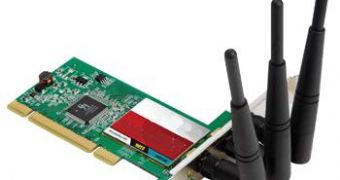Today's 802.11 b/g wireless standard could soon be history as the emerging 802.11n Wi-Fi networking standard is expected to become the next major upgrade to current wireless technology. Although you might think that the 802.11n has already been released, the fact is that equipment manufacturers have released their 802.11n-compliant products, relying on drafts. However, it looks like the final draft is on its way and users will soon be able to fully benefit from the technological advantages of the new wireless standard.
The IEEE (Institute of Electrical and Electronics Engineers) has not yet approved the final 802.11n wireless technology, but some wireless devices, including routers and notebooks, already feature support for the emerging specification. The new technology has been designed to deliver new features, including multiple-input/multiple output (MIMO) and channel-bonding/40MHz operation, ultimately improving wireless connectivity for supporting devices.
"MIMO will do a lot to improve reliability and predictability for 802.11b/g transmissions," asserted Chris Kozup, senior manager, mobility solutions marketing, at Cisco and a speaker at Interop, a leading business technology event that has been taken place at the Javits Center in New York, staring from September 15 up until today.
MIMO is a technology that is aimed at using multipath signals, or reflected signals that arrive at the receiver after the LOS (line of sight) signal has been received, to improve the receiver's ability to recover the message information. Channel bonding has more to do with the amount of data that can be sent utilizing two separate non-overlapping channels for transmission.
The 802.11n-enabled devices will only be capable of proving their true benefits if they meet DHS certification for using radar channels in the 5 GHz band, according to Cisco's Kozzup. Otherwise, devices working in that spectrum will shift channels in the presence of radar. Currently Cisco and Xirrus are the only certified vendors that can use these radar channels, according to Kurt Sauter, Xirrus' director of product marketing.

 14 DAY TRIAL //
14 DAY TRIAL //